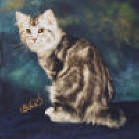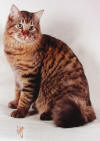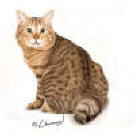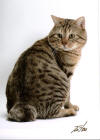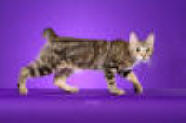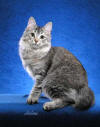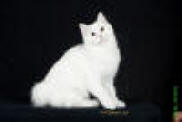|
TRADITIONAL AMERICAN
BOBTAIL CAT © ®
HISTORY - PERSONALITY - HEALTH
Copyright © Trademark ® Diana Fineran, January 2, 2007
Photos Provided By Patricia Peters - All Photos Are Copyrighted
HISTORY
The Traditional American Bobtail was noticed in the 1960’s,
but had been a part of American heritage much earlier. It was a vacation near
an Indian Reservation in Arizona by John and Brenda Sanders where the some what
fuzzy beginnings of the recognition of the breed began. A short tailed, brown
Tabby, male named, Yodie, was obtained by the Sanders there and taken home with
them to Iowa. Subsequently the recognized bloodline came from a breeding between
Yodie and a long tailed, Seal Point, Siamese female. Yodie’s parentage was
unknown, but is believed to have been a bobcat – domestic cat hybrid because of
his stubby tail. There is also the possibility of an inheritance from a kinked
tailed ancestor from Thailand.
Later Birman, Himalayan and a Himalayan – Siamese cross
were added to the bloodline. The original blue print for the breed was a short
tailed, pointed, long hair with white mittens and a white face blaze. They come
in both short and long haired varieties.
The earliest Bobtail breeder was Mindy Cave, a friend of
the Sanders. Early in the 1970’s the breed experienced set backs caused by the
cat associations Ms. Cave had approached for acceptance. TCA, INC. has no such
blockading policies.
By the 1980’s most of the early bloodlines were phased
out. It was stated, The original line became too inbred to be usable. Use of a
short tail gene, the Siamese color pattern and the white spotting gene became
unmanageable. Focus on the Colorpoint cat waned, although they are still
present in the breed. The original idea and name remained.
New Traditional American Bobtail bloodlines were started by
breeders in Florida who bred domestic cats and bobcats to produce kittens to
further the breed. Such breedings were not documented because there was this
explanation, “well, our cat got out, and there were these bobcats running around
all over the place, and then the kittens were born with those stubby little
tails…”
It is possible for the American Bobcat (Felis rufus, a
solely North American spotted cat closely related to the larger-sized Lnyx) to
mate with domestic cats. However, the resulting hybrids would most likely be
sterile. More probable would be a spontaneous mutation within the domestic cat
population or the presence of a Manx type gene. Neither Manx, Japanese Bobtails
nor bobcats used in the breeding program today.
Both long tails and bob tails can be produced in litters.
No two tails are the same. The average length of the tail is one to four
inches. However, this is an average. Some tails may be shorter or longer.
PERSONALITY
This beguiling breed is a sweet, personable, loving, kind,
domestic cat that has the natural, wild appearance of the Bobcat. Being playful,
friendly and energetic, coupled with an incredible intelligence, makes them fun
companions to own. Being people centered, they may demand human attention by
meowing or commandeering available laps. They want to give kisses all the
time.
Some of the things they are not is: They talk but are not
demanding. They love to play but are not rambunctious. Maturing slowly they
are not wild when young. They are not vertically inclined, so they do not climb
drapes and screen doors. They are not aloof.
Fun loving and frisky, yet not over active. Just pick them
up and they are all purrs.
They are very similar to the favorite dog breeds, being
protective of their owners, yet don’t bond with any one member or the household,
but rather all members, even the family parrot or dog. Though shy at first, they
interact remarkably well with other cats and dogs. A happy go lucky, out going
attitude makes them wonderful companions on trips. Their active need for company
all of the times leads them to follow you from room to room or be with you as
you do daily chores.
A Clown like attitude make them a great source of
entertainment in the home. They will often initiate a game and can be
persistent until a family member plays with them.
Mostly quiet in voice, they do chirp, click and trill when
delighted. Easily leash trained, they love to go on walks. A love of shiny
objects, makes it necessary to keep jewelry boxes closed.
So tuned in to their people feelings, they will come
running in an instant, when a family member is in need, using their patience,
caring and understanding to sooth any trouble.
Well mannered, adaptable, and out going, they make
excellent family pets.
HEALTH
Maintenance of a clean environment with love and
Veterinarian care, they live most comfortably.
|
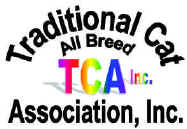
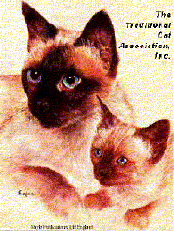 The
Traditional Cat Association,
Inc.©1987®TM
Official Website
The
Traditional Cat Association,
Inc.©1987®TM
Official Website



